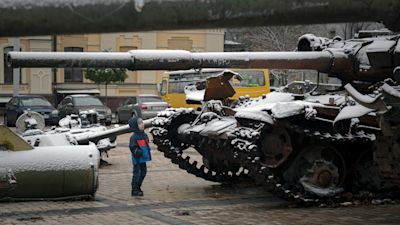Ukraine: 10 million people without power after Russian missile strikes

Ten million Ukrainians have been left without power after a fresh bombardment of Russian missile strikes.
President Volodymyr Zelenskyy has said alongside the power outages, at least seven people have been killed in the strikes - a number that is expected to rise.
Speaking in his nightly address, he said "everything" was being done to "normalise supply".
Russian airstrikes targeted Ukraine’s energy facilities as the first snow of the season fell in Kyiv, a harbinger of the hardship to come if Moscow’s missiles continue to take out power and gas plants as winter descends.
Separately, the United Nations announced the extension of a deal to ensure exports of grain and fertilisers from Ukraine that were disrupted by the war.
The deal was set to expire soon, renewing fears of a global food crisis if exports were blocked from one of the world's largest grain producers.
Even as all sides agreed to extend the grain deal, air raid sirens sounded across Ukraine on Thursday.
The Kremlin’s forces have suffered a series of setbacks on the ground, the latest being the loss of the southern city of Kherson.
In the face of those defeats, Russia has increasingly resorted to aerial onslaughts aimed at energy infrastructure and other civilian targets in parts of Ukraine it doesn’t hold.
Earlier this week, Russia unleashed a nationwide barrage of more than 100 missiles and drones - strikes described by Ukraine’s energy minister as the biggest assault yet on the country's battered power grid in nearly nine months of war.
It also resulted in a missile landing in Poland, killing two people.
Authorities still were trying to ascertain where that missile came from, with early indications pointing to a Ukrainian air defence system seeking to counter the Russian bombardment.
Polish President Andrzej Duda on Thursday visited the site where the missile landed and expressed understanding for Ukraine’s plight.
“It is a hugely difficult situation for them and there are great emotions, there is also great stress,” Duda said.
On Thursday in eastern Ukraine, Russia “launched a massive attack on gas production infrastructure," said the chief of the state energy company Naftogaz, Oleksiy Chernishov. He did not elaborate.
Russian strikes also hit the central city of Dnipro and Ukraine’s southern Odesa region for the first time in weeks and hit critical infrastructure in the north-eastern Kharkiv region near Izium, wounding three workers.
The head of Ukraine’s presidential office, Andriy Yermak, called the strikes on energy targets “naive tactics of cowardly losers.”
“Ukraine has already withstood extremely difficult strikes by the enemy, which did not lead to results the Russian cowards hoped for,” Yermak wrote on Telegram on Thursday.
Earlier on Thursday, Zelenskyy posted a video on Telegram that he said was of one of the blasts in Dnipro. The footage from a vehicle dashboard camera showed a fiery blast engulfing a rainy road.
“This is another confirmation from Dnipro of how terrorists want peace,” Zelenskyy wrote, referring to the Kremlin's forces. “The peaceful city and people’s wish to live their accustomed lives. Going to work, to their affairs. A rocket attack!”
Elsewhere on Thursday, a Russian strike that hit a residential building killed at least seven people overnight in Vilniansk in the southern region of Zaporizhzhia. Rescuers combed the rubble, searching for any other victims.
Officials in northeast Ukraine's Poltava and Kharkiv regions and the Khmelnytskyi and Rivne regions in the west urged residents to stay in bomb shelters.
The UN nuclear watchdog has warned that the repeated strikes on Ukraine’s electricity grid were endangering the country's nuclear power plants.
The reactors need power for cooling and other essential safety functions, and their emergency generators can only provide back-up electricity for a limited period of time.
Want a quick and expert briefing on the biggest news stories? Listen to our latest podcasts to find out What You Need To Know.